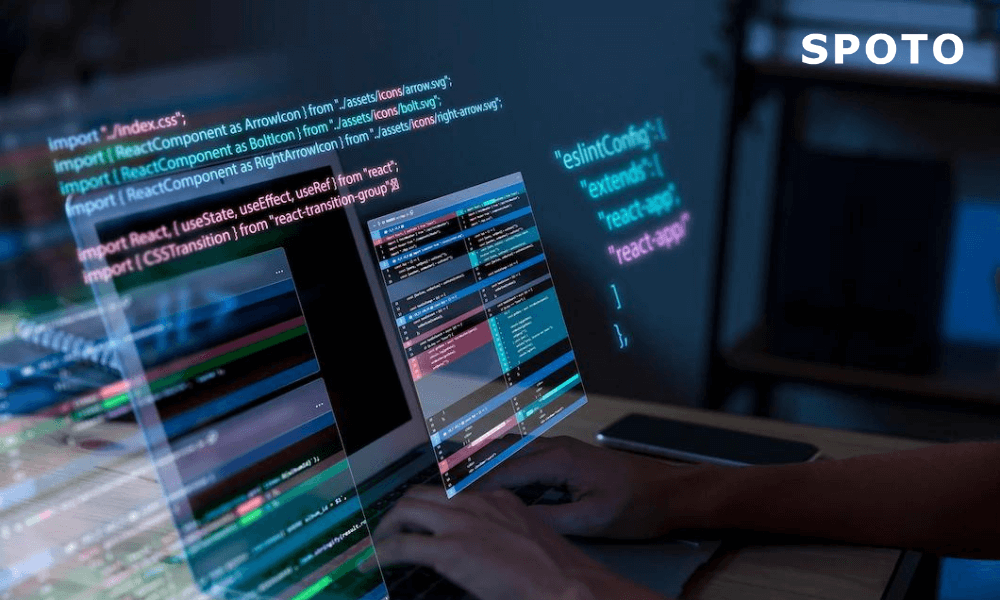TRUSTED BY THE SMARTEST TEAMS IN THE WORLD FOR CERTIFIED CANDIDATES
SPOTO Blogs
Useful learning materials to become certified IT personnel
-
- 1414
- SPOTO
- 2024-02-03 15:14
-
- 1346
- SPOTO
- 2024-01-30 14:52
-
- 1296
- SPOTO
- 2024-01-09 17:08
-
- 819
- SPOTO
- 2024-01-09 15:34
-
- 1198
- SPOTO
- 2024-01-09 14:56
-
- 958
- SPOTO
- 2023-10-25 10:38
-
- 1679
- SPOTO
- 2023-10-12 17:45
-
- 1873
- SPOTO
- 2023-10-11 11:19
-
- 1532
- SPOTO
- 2023-10-07 15:16
TRUSTED BY THE SMARTEST TEAMS IN THE WORLD FOR CERTIFIED CANDIDATES
SPOTO Blogs
Useful learning materials to become certified IT personnel
-
- 1414
- SPOTO
- 2024-02-03 15:14
Table of ContentsCCIE Security: Securing the Digital FrontierCCIE Data Center: Managing the Heart of Modern ITCisco's Commitment to Certification EvolutionHow Can I Get Certified as a CCIE?Industry Trends and Job OpportunitiesConclusion Within the IT industry, networking is one area where varying degrees of access or assistance are needed for various aspects or fields. All businesses globally would need networks and networking specialists who could meet their unique network requirements. The world's businesses have seen rapid expansion due to ongoing capitalization and industrialization, which has increased the demand for networking specialists. It is because a lack of these people is needed to satisfy the world's expanding networking demands. People who deal with networks must complete a specific set of duties to protect and preserve the security of data via networks, reducing the likelihood of issues. Cisco Certified Internetwork Expert (CCIE) certifications have long been considered the gold standard for networking professionals, and two popular tracks within this certification are CCIE Security and CCIE Data Center. But with the ever-shifting IT landscape, one may wonder if there's a promising future for these certifications. Here, we'll delve into the current state and the potential outlook for CCIE Security and Data Center tracks. CCIE Security: Securing the Digital Frontier CCIE Security has always held a prominent position in network security certifications. It signifies a high level of expertise in designing, implementing, and managing secure network infrastructures. While the landscape of network security has evolved dramatically in recent years, the need for skilled security professionals remains constant. One of the key factors contributing to the continued relevance of CCIE Security is the ever-increasing cyber threat landscape. As technology advances, so do the methods and tactics of cybercriminals. Organizations need experts who can safeguard their digital assets and sensitive information. CCIE Security professionals get equipped with the knowledge and skills required to protect networks against evolving threats. Organizations require security experts who can adapt to these new challenges and implement robust security measures in complex, hybrid environments. CCIE Security certification addresses these demands, ensuring certified professionals are well-prepared to tackle modern security challenges. Additionally, regulatory compliance has become a critical aspect of cybersecurity. CCIE Security training includes a comprehensive understanding of compliance standards and best practices, making certified professionals invaluable assets in helping organizations meet regulatory requirements. CCIE Data Center: Managing the Heart of Modern IT The CCIE Data Center certification focuses on the design, implementation, and management of data center technologies and infrastructures. As organizations increasingly rely on data centers to support their operations, the demand for skilled data center professionals continues to grow. One of the key drivers behind the demand for CCIE Data Center professionals is the ongoing digital transformation. Modern businesses require agile and scalable data center solutions to support their cloud-based applications and services. CCIE Data Center-certified professionals possess the expertise to design and maintain these mission-critical infrastructures. Furthermore, the COVID-19 pandemic has accelerated the adoption of remote work and digital services, placing additional strain on data center resources. Organizations need experts who can optimize data center performance, ensure high availability, and implement disaster recovery plans. CCIE Data Center professionals are well-versed in these areas, making them indispensable in the current business landscape. Cisco's Commitment to Certification Evolution Cisco, the organization behind CCIE certifications, understands the importance of staying current with industry trends and technology advancements. To ensure the continued relevance and competitiveness of CCIE Security and Data Center certifications, Cisco regularly updates the certification exams and course content to reflect the latest developments in the field. The recent shift from written exams to hands-on, practical lab exams in the CCIE certification process is a testament to Cisco's commitment to providing relevant and up-to-date training. These lab-based exams require candidates to demonstrate their practical skills and problem-solving abilities, ensuring that CCIE professionals prepare for real-world challenges. Moreover, Cisco's certification ecosystem is designed to support professionals throughout their careers. Recertification requirements encourage CCIEs to stay current with evolving technologies by earning continuing education credits, attending training courses, or passing relevant exams. This proactive approach to maintaining certification ensures that CCIE Security and Data Center professionals remain at the forefront of their respective fields. How Can I Get Certified as a CCIE? To progress in your job, certificates and training programs are useful, but you need practical experience and a solid grasp of the technology. Before signing up for a training session, it's crucial to thoroughly assess your professional goals and the value that a CCIE certification will bring to your job. Pursuing a CCIE certification takes a massive time and resource investment. Among the top networking training providers, Network Bulls offers CCIE Security V6 Training, CCIE Security Courses, CCIE Enterprise Infrastructure Courses, CCIE R&S Courses, and other CCIE Courses. Network Bulls states that its courses come with a 100% job guarantee, which those seeking to further their careers or find better employment opportunities could find appealing. CCIE training and placement in network bulls CCIE Enterprise, CCIE Security, CCIE Service Provider, and CCIE Data Center are among the many tracks we provide CCIE certification training. Our courses include theory and practice and are intended to assist students in getting ready for the CCIE certification tests. We provide training for the CCIE certification and other Cisco certifications like the CCNA (Cisco Certified Network Associate) and CCNP (Cisco Certified Network Professional). Industry Trends and Job Opportunities Cybersecurity professionals, including those with CCIE Security certification, were in high demand across various industries. With the increasing frequency and sophistication of cyberattacks, organizations were willing to invest in top-tier talent to protect their digital assets. The growing importance of cloud security, network segmentation, and threat detection and response fueled the demand for CCIE Security professionals. Similarly, data center professionals, particularly those with CCIE Data Center certification, were sought after to design and manage data center infrastructures that support modern applications and services. The shift towards hybrid and multi-cloud environments meant that data center expertise was crucial for optimizing resource allocation, ensuring high availability, and enabling scalability. Conclusion In the ever-evolving landscape of information technology, Cisco's CCIE Security and Data Center certifications hold significant value. The demand for skilled professionals in these domains remains strong, driven by evolving cyber threats, digital transformation, and the ongoing reliance on -
- 1346
- SPOTO
- 2024-01-30 14:52
Table of ContentsCisco Certified Internetwork Expert (CCIE)Cisco Certified Design Professional (CCDP)Cisco Certified CyberOps AssociateCisco Certified Network Professional (CCNP) Data CenterCisco Certified Network Professional (CCNP) SecurityCisco Certified Internetwork Expert (CCIE) SecurityCisco Certified DevNet ProfessionalCisco Certified Internetwork Expert (CCIE) Enterprise InfrastructureCisco Certified Design Expert (CCDE)Conclusion A key strategy for matching candidates to specific jobs is to validate their IT knowledge and skills through certification. It is possible to create an adaptable IT profession with Cisco certifications. Whether you're starting at the entry-level or working your way up to an advanced level of certification, pick your technological path and grow your career now. Among the most widely regarded globally are networking credentials from Cisco. Cisco certification is arguably the most well-known of all networking certifications. A wide range of technologies cover the several Cisco certifications, which range from entry-level to professional level. The knowledge and abilities of professionals validate Cisco certifications regarded globally. Cisco Certified Internetwork Expert (CCIE) The Cisco Certified Internetwork Expert (CCIE) certification is widely regarded as one of the most prestigious and highest-paying certifications in the networking industry. CCIE certification comes in various tracks, including Enterprise, Data Center, Security, Collaboration, and more. Earning CCIE certification demonstrates a deep level of expertise in your chosen track and is often required for senior-level networking positions. CCIEs are known to command some of the highest salaries in the IT field. These professional sought-after organizations require top-tier network architects, engineers, and administrators. The rigorous CCIE exams and hands-on lab tests ensure that certified individuals who possess advanced skills and knowledge are in high demand. Cisco Certified Design Professional (CCDP) This certification covers the expertise needed to create an enterprise-class, Cisco-based network from the ground up. Cisco Certified Design Professionals are required to have a variety of technical essentials for troubleshooting and fixing subpar networks and building and deploying networks. Pro tip: You may get the foundational knowledge needed to pursue a range of profitable IT occupations from most Cisco training classes. Cisco Certified CyberOps Associate With the increasing frequency and complexity of cyber threats, the demand for cybersecurity professionals has skyrocketed. The Cisco Certified CyberOps Associate certification addresses this need by preparing individuals for careers in cybersecurity operations. Certified CyberOps Associates have a strong foundation in security fundamentals, network intrusion analysis, and security monitoring. Due to the critical nature of cybersecurity, professionals with this certification can command competitive salaries in the job market. Cisco Certified Network Professional (CCNP) Data Center The CCNP Data Center certification track focuses on data center technologies and is designed for professionals responsible for managing and implementing data center solutions. This track includes certifications such as CCNP Data Center, CCIE Data Center, and CCDE (Cisco Certified Design Expert) Data Center. Data center professionals with CCNP Data Center certifications often earn competitive salaries due to the specialized nature of their expertise. As organizations invest in data center infrastructure, demand for skilled professionals remains high. This certification offers a rewarding career path for those interested in data center technologies. Cisco Certified Network Professional (CCNP) Security Security is a top priority for organizations in today's digital landscape, and the CCNP Security certification track addresses this critical need. CCNP Security includes certifications like network security, identity management, and VPN technologies. Professionals who hold the CCNP Security certification are tasked with safeguarding an organization's systems and data from potential cyber threats. As the need for skilled cybersecurity experts increases, individuals who are certified in CCNP Security can often expect to receive competitive salaries. With the constant evolution of the threat landscape, organizations are willing to invest in experts who can provide robust network and information security. Cisco Certified Internetwork Expert (CCIE) Security Building upon the foundation of CCNP Security, the CCIE Security certification is the pinnacle of Cisco's security certifications. CCIE Security-certified professionals possess advanced knowledge and skills in network security and are often tasked with designing and implementing complex security solutions. The CCIE Security certification is well-known for its high earning potential. It requires extensive training and practical experience. Individuals possessing this certification are highly sought after, especially in industries such as government, banking, and healthcare that place a premium on data security and compliance. Cisco Certified DevNet Professional The Cisco Certified DevNet Professional certification track is relatively new but has gained significant attention in the IT industry. It is designed for professionals who specialize in network automation, software development, and programmability. With the increasing importance of automation in the network, seek DevNet professionals to streamline operations and reduce manual configuration tasks. DevNet professionals often command competitive salaries due to their unique skill set. Their ability to write code, automate network tasks, and develop custom applications allows organizations to operate more efficiently and respond to changing business needs. Cisco Certified Internetwork Expert (CCIE) Enterprise Infrastructure The CCIE Enterprise Infrastructure certification track is designed for networking professionals who want to specialize in enterprise infrastructure technologies. It covers topics like advanced routing and switching, SD-WAN, and network automation. Earning a CCIE Enterprise Infrastructure certification signifies a high level of expertise in building and maintaining complex enterprise networks. Cisco Certified Design Expert (CCDE) The Cisco Certified Design Expert (CCDE) certification is for experienced network design professionals. CCDE-certified individuals possess the skills to design complex, large-scale networks for organizations. They are responsible for creating network architectures that are not only efficient but also highly secure. Given the critical role of network design in ensuring organizational success, CCDE-certified professionals are often well-compensated. Salaries for CCDE-certified experts can range from six figures to well above, making it one of the best-paying Cisco certification tracks for design-focused professionals. Conclusion The Cisco certification tracks mentioned above offer some of the best earning potential in the IT industry. It is crucial to realize that there are other factors besides earning a certification in a certain sector that affect wage levels. The criteria of the company, location, and other elements like experience all play a big role in determining pay. The best-paying Cisco certification track for you would depend on your interests, career goals, and the demands of the job market in your region. No matter which certification track you opt for, acquiring a Cisco certification can significantly enhance your career opportunities and open avenues for higher-paying positions in the ever-evolving field of networking and information technology. -
- 1296
- SPOTO
- 2024-01-09 17:08
Table of ContentsCCIE Passing Rate: A Revealed ChallengeNavigating CCIE Lab Costs: First Attempt MattersMastering CCIE Practice: Tips for SuccessUnlock Success: SPOTO CCIE Lab Simulator Venturing into the pursuit of Cisco Certified Internetwork Expert (CCIE) status involves a challenging yet immensely rewarding journey. At the heart of this challenging journey lies the CCIE Practice Lab, a critical component designed to assess your hands-on skills and real-world problem-solving abilities in a simulated network environment. The CCIE certification is widely recognized as a pinnacle achievement in the field of networking, indicating a level of expertise that goes beyond theory and extends into the practical realm of designing, implementing, and troubleshooting complex network infrastructures. CCIE Passing Rate: A Revealed Challenge It's no secret that achieving CCIE certification is no walk in the park. The statistics speak for themselves, with the CCIE passing rate standing at a mere 26%. This low success rate is not an indication of the exam's difficulty alone, but also reflects the demanding nature of the CCIE Practice Lab. The Practice Lab serves as a litmus test for candidates, pushing them to demonstrate proficiency in a simulated yet highly realistic network environment. This dynamic testing ground is known to challenge even the most seasoned professionals, contributing to the lower passing rate. Furthermore, the financial investment required to attempt the CCIE Lab multiple times cannot be overstated. Beyond the exam fees, there are considerations such as study materials, practice labs, and possibly even travel expenses. Failing the lab exam not only results in additional expenses for reattempting but also translates into delays in career progression. Given the high stakes involved, approaching the CCIE Lab with a mindset focused on mastery and success on the first attempt is not just a preference but a necessity. The investment in time, effort, and resources should yield returns in the form of a CCIE certification, catapulting your career to new heights. Navigating CCIE Lab Costs: First Attempt Matters The financial implications of attempting the CCIE Lab multiple times cannot be overstated. Beyond the exam fees, there are considerations such as study materials, practice labs, and possibly even travel expenses. Failing the lab exam not only results in additional expenses for reattempting but also translates into delays in career progression. Given the high stakes involved, approaching the CCIE Lab with a mindset focused on mastery and success on the first attempt is not just a preference but a necessity. The investment in time, effort, and resources should yield returns in the form of a CCIE certification, catapulting your career to new heights. Mastering CCIE Practice: Tips for Success Success in the CCIE Practice Lab requires a strategic and disciplined approach. Here, we delve into comprehensive tips to enhance your preparation and boost your chances of success: Thorough Familiarization: Delve deep into the exam content, ensuring a comprehensive understanding of every topic. Review official Cisco documentation, study guides, and practice exams to grasp the breadth of knowledge required. Consistent Practice: Regularly engage in hands-on practice in a simulated environment. Utilize tools like SPOTO's CCIE Lab simulator to replicate real-world scenarios and refine your technical skills, troubleshooting abilities, and overall familiarity with Cisco technologies. Strategic Time Management: Time is a critical factor in the CCIE Lab. Practice effective time management during your preparation to simulate exam conditions. Allocate time for each section, and practice staying within the time constraints to ensure efficiency during the actual exam. Utilize Available Resources: Leverage a variety of resources, including online forums, study groups, and expert guidance. Engage with the CCIE community to share experiences, gather insights, and stay updated on the latest industry trends and Cisco technologies. Feedback and Iteration: Regularly assess your performance through mock exams and practice labs. Analyze feedback, identify areas of improvement, and iterate on your study plan. The iterative process ensures continuous enhancement of your skills and knowledge. Mental Preparedness: Recognize the mental challenges associated with the CCIE Lab. Develop strategies to stay focused, manage stress, and maintain a positive mindset. Cultivate resilience to navigate unexpected issues during the exam confidently. Documentation Skills: Sharpen your documentation skills, as precise and concise documentation is crucial in the CCIE Lab. Practice creating clear and organized documentation for network designs, configurations, and troubleshooting steps. By incorporating these comprehensive tips into your preparation strategy, you'll not only be well-equipped to face the challenges of the CCIE Practice Lab but also significantly improve your passing rate on the first attempt. Unlock Success: SPOTO CCIE Lab Simulator Amidst the challenges and complexities of the CCIE Practice Lab, SPOTO emerges as the ultimate solution to guide you towards success. Our CCIE Lab simulator not only replicates the actual exam environment one-to-one but is also enriched by the expertise of senior CCIE professionals. The SPOTO CCIE Lab simulator is not just a tool; it's a comprehensive support system. Our senior CCIE experts provide guidance on professional knowledge, offer insights into the nuances of the exam, and provide invaluable advice on details such as time management and strategy implementation. This holistic approach significantly enhances your preparation and improves the pass rate of the CCIE Lab. Mastering the CCIE Practice Lab is not just about passing an exam; it's about proving your proficiency in real-world scenarios. Don't leave your success to chance – choose SPOTO's CCIE Lab simulator as your strategic ally in this challenging journey. Seize Success with SPOTO! -
- 819
- SPOTO
- 2024-01-09 15:34
Table of ContentsNetwork Fundamentals and CCIE Certification AdvantagesCCIE Certification Exam: Topics and EssentialsCCIE Certification Challenges: Low Pass Rates and High CostsSPOTO CCIE Labs: Your Gateway to Success In the fast-evolving world of IT, staying ahead of the curve is essential. One way to demonstrate your expertise and proficiency in networking technologies is by obtaining the prestigious Cisco Certified Internetwork Expert (CCIE) certification. This certification is highly regarded in the industry and can open doors to lucrative career opportunities. However, achieving CCIE certification is no easy feat, and it requires rigorous preparation and practice. In this article, we will delve into the world of CCIE Practice Labs, exploring the network background, the benefits of CCIE certification, exam topics, passing rate, and the invaluable resources offered by SPOTO CCIE Labs. Network Fundamentals and CCIE Certification Advantages Before we dive into the specifics of CCIE Practice Labs, let's first understand the network background and the benefits of obtaining CCIE certification. In today's digital landscape, networks form the backbone of businesses and organizations, enabling seamless communication, data transfer, and connectivity. As such, skilled network engineers who possess in-depth knowledge of networking technologies are in high demand. CCIE certification is the pinnacle of networking certifications offered by Cisco. It demonstrates an individual's ability to plan, operate, and troubleshoot complex, converged network infrastructures. By obtaining CCIE certification, professionals can showcase their expertise in areas such as routing and switching, security, service provider, collaboration, data center, and wireless networking. This certification not only validates one's technical skills but also enhances their credibility and marketability in the industry. CCIE Certification Exam: Topics and Essentials The CCIE certification exam covers a wide range of topics that are crucial for network engineers to master. These topics include but are not limited to network principles and protocols, virtualization, infrastructure security, automation, and network programmability. The exam is designed to assess an individual's ability to design, implement, operate, and troubleshoot complex network infrastructures in real-world scenarios. In addition to the theoretical knowledge, CCIE candidates are expected to demonstrate practical proficiency in configuring and troubleshooting network devices. This hands-on aspect of the exam is where CCIE Practice Labs play a pivotal role in helping candidates hone their skills and build confidence in tackling real-world networking challenges. CCIE Certification Challenges: Low Pass Rates and High Costs It's important to note that the CCIE certification exam is known for its low passing rate, with only 26% of candidates successfully clearing the exam on their first attempt. This statistic underscores the rigorous nature of the exam and the level of expertise required to achieve CCIE certification. Furthermore, the cost associated with pursuing CCIE certification is substantial, encompassing exam fees, study materials, training courses, and potential retake expenses. Given the low passing rate and high cost of CCIE certification, it becomes imperative for aspiring candidates to have access to comprehensive resources and support systems that can maximize their chances of success. SPOTO CCIE Labs: Your Gateway to Success SPOTO CCIE Labs stands out as a leading provider of specialized resources designed to help candidates conquer the challenges of CCIE certification. The SPOTO CCIE Labs not only provide a detailed understanding of exam topics, timelines, and test points but also offer personalized guidance from seasoned CCIE experts. One of the key advantages of SPOTO CCIE Labs is the hands-on experience they offer through simulated practice labs. These labs are meticulously designed to replicate real-world networking scenarios, allowing candidates to apply their knowledge in a practical setting. By immersing themselves in these practice labs, candidates can refine their skills, identify areas for improvement, and gain the confidence needed to excel in the actual exam. Moreover, SPOTO CCIE Labs provide one-on-one mentorship from certified CCIE professionals who offer invaluable insights, tips, and strategies for mastering the exam. This personalized guidance can make a significant difference in enhancing a candidate's understanding of complex networking concepts and refining their problem-solving abilities. In conclusion, mastering CCIE Practice Labs is essential for anyone aspiring to achieve CCIE certification. With the demanding nature of the certification exam, coupled with its low passing rate and high cost, leveraging the resources provided by SPOTO CCIE Labs can be a game-changer. By immersing oneself in hands-on practice labs and receiving personalized guidance from industry experts, aspiring CCIE candidates can significantly increase their chances of success. SPOTO CCIE Labs not only equip candidates with the technical skills required for the exam but also instill the confidence and competence needed to thrive in the dynamic world of networking technologies. -
- 1198
- SPOTO
- 2024-01-09 14:56
Table of ContentsWhat Is CCIE Certification?CCIE Certification Tracks ExplainedCCIE Exam Format & RequirementsCertification Renewal & Continuing EducationOfficial Study ResourcesNext Steps Achieving your Cisco Certified Internetwork Expert (CCIE) certification places you among the top 1% of network engineers worldwide. This guide explains what CCIE certification is, walks you through each expert‑level track, details the two‑step exam process, and shares official study resources—optimized for the queries driving the most impressions to your site. What Is CCIE Certification? The CCIE certification is Cisco’s most prestigious expert‑level credential, demonstrating advanced knowledge and hands‑on skills in designing, deploying, operating, and optimizing complex network solutions. Earning CCIE involves passing both a rigorous written exam and an intensive hands‑on lab—proving you can tackle real‑world networking challenges. No formal prerequisites exist, but 3–5 years of networking experience is strongly recommended before attempting CCIE. CCIE Certification Tracks Explained Cisco offers eight expert‑level CCIE specializations. Below is a summary of each track, reflecting Cisco’s current structure as of October 1, 2023: Track Focus Areas CCIE Enterprise Infrastructure Dual‑stack (IPv4/IPv6), SD‑WAN, automation, virtualization, security CCIE Enterprise Wireless WLAN design, RF theory, mobility services, security CCIE Data Center ACI, UCS, storage networking, automation CCIE Security VPNs, firewall, identity services, threat defense CCIE Service Provider Core routing, MPLS, segment routing, QoS CCIE Collaboration Voice, video, conferencing, edge services Cisco Certified DevNet Expert Network programmability, APIs, software development CCDE (Design Expert) Network design methodologies, advanced infrastructure planning To learn more about each track's objectives and exam topics, visit Cisco's certification page. CCIE Exam Format & Requirements 1. Written Core Exam Duration: 120 minutes Format: 90–110 multiple‑choice and scenario‑based questions Cost: US$400 (or use Cisco Learning Credits) Outcome: Passing the core exam also awards a Cisco Certified Specialist credential in that technology. 2. Hands‑On Lab Exam Duration: 8 hours Format: Configurations and troubleshooting in live network scenarios Cost: US$1,600 (or use Cisco Learning Credits) Version: CCIE Enterprise Infrastructure Lab v1.1 (released September 20, 2023) You must pass the lab within 18 months of passing the written exam. Certification Renewal & Continuing Education Renewal Cycle: Every three years, up from the previous two‑year term. Methods to Recertify: Pass any current CCIE written or lab exam Complete Cisco’s Continuing Education credits via authorized training and virtual labs Cisco Expert Prep Program: Offers mentoring, hands‑on practice, and exam readiness workshops. Official Study Resources Resource Description Cisco U. Learning Paths Guided modules, pre‑/post‑assessments, hands‑on labs, and practice tests Cisco Expert Prep Program Mentoring, lab workshops, and peer communities Official Cert Guides (Cisco Press) Track‑specific study guides and practice exams Cisco Live On‑Demand Recorded sessions, labs, and tutorials Cisco Documentation & White Papers In‑depth protocols, design guides, and best practices Next Steps Schedule your written exam on Cisco’s website. Map out a study plan using Cisco U. learning paths and Official Cert Guides. Join the Cisco Expert Prep Program for lab mentoring and community support. Monitor your Search Console for “cisco ccie certification” and related keywords—adjust on‑page content quarterly. -
- 958
- SPOTO
- 2023-10-25 10:38
Table of ContentsThe Significance of Network Design:The Role of Cisco Training:Crafting Superior Network Design Blueprints:The Cisco Training Experience:Advantages of Cisco Training for Network Design:How Does a Successful Network Appear?Conclusion: Networking is a critical component of every IT firm. But how can you proceed with the notion of improving your network design blueprint if you are not thinking about developing your design capabilities? You must first consider what makes a good design before you can move on. Making a network blueprint facilitates the creation of logical network architectures from physical devices. You may create a subnet that is accessible to the public by following the blueprints, which facilitates hosting web applications. Furthermore, a more intricate architectural plan may enable you to link your public cloud resources to off-the-grid or internal corporate data centers. Efficiency, reliability, and security of networks are paramount to seamless digital operations. Cisco, a pioneer in networking solutions, has been instrumental in shaping the digital landscape with innovative technologies. However, even the most advanced technology requires skilled individuals to harness its potential. It is where Cisco training comes into play, enabling network teams to create superior network design blueprints that form the foundation of robust and high-performing networks. The Significance of Network Design: Network design serves as the architectural framework upon which all digital interactions are built. A well-crafted network design ensures data flows efficiently, applications perform optimally, and users experience minimal disruptions. It considers factors such as scalability, redundancy, security, and quality of service to provide a seamless experience to end-users. An effective network design blueprint serves as the roadmap for building and maintaining networks that meet the evolving needs of organizations. The Role of Cisco Training: Cisco's comprehensive training programs were designed to equip network professionals with the knowledge and skills essential to design, implement, and manage networks using Cisco technologies. These training programs encompass various topics, from fundamental networking concepts to advanced architecture and design principles. By undergoing Cisco training, network teams gain a competitive edge, enabling them to create network design blueprints that align with best practices and industry standards. Crafting Superior Network Design Blueprints: Cisco training empowers network teams to craft superior network design blueprints through various means: In-depth Understanding: Cisco training delves into the intricate details of networking technologies, protocols, and architecture. This deep understanding is essential for designing networks that handle complex traffic patterns and diverse user needs. Best Practices: Cisco has been a pioneer in networking for decades, accumulating a wealth of best practices and design guidelines. By incorporating these practices, network teams can ensure the reliability, security, and efficiency of their networks. Scalability: Modern networks must accommodate growth without sacrificing performance. Cisco training emphasizes scalable design principles, enabling network teams to create networks that can expand as demands increase. Security: Network security is a critical consideration in today's digital landscape. Cisco training equips professionals with the knowledge to embed security features into network design blueprints, safeguarding data and communication. Quality of Service (QoS): Applications with different requirements, such as voice and video, demand varying levels of network resources. Cisco training enables network teams to implement QoS mechanisms that prioritize critical applications. The Cisco Training Experience: Cisco training offers a structured and comprehensive learning experience tailored to professionals at various levels of expertise: Foundational Courses: Beginners can start with foundational courses that cover networking fundamentals, providing a strong basis for understanding more advanced concepts. Design Tracks: Cisco offers specific design-focused training tracks. These cover topics like network design principles, advanced routing and switching, and designing for security. Hands-On Labs: Practical experience is invaluable for translating theory into real-world applications. Cisco training often includes hands-on labs that simulate real scenarios, allowing professionals to practice their skills. Certification Paths: Cisco certifications like CCDE validate design expertise. Training prepares individuals for certification exams. Advantages of Cisco Training for Network Design: Cisco training provides professionals with: Expertise: Cisco training imparts deep knowledge of networking technologies and design principles, enabling professionals to create effective and efficient network design blueprints. Adherence to Standards: Cisco training ensures network teams are well-versed in industry standards and best practices, resulting in blueprints that meet compliance requirements and deliver optimal performance. Adaptability: The digital landscape evolves rapidly. Cisco training equips professionals to design networks that can adapt to emerging technologies and changing business needs. Reduced Downtime: A well-designed network is less prone to disruptions and downtime. Cisco training helps professionals create blueprints that minimize the risk of service interruptions. Recognition and Credibility: Cisco certifications are recognized globally and are a testament to professionals' expertise. Having certified network designers on your team enhances your organization's credibility. How Does a Successful Network Appear? The majority of organizations may require some or all of the network's following capabilities to be deemed effective, taking current trends and requirements into consideration: The network must function 24 hours a day. It should feature an automated backup mechanism that doesn't disrupt network services in the event of any problems, such as broken links, overload circumstances, or equipment failure. Depending on the host it is serving, the network must be able to deliver slick apps and provide fair response times. Strong security backups are required for the networks. Along with the other devices that get linked to it, it should be able to safeguard not just the data that gets stored on it but also the data that gets transferred over it. It should be simpler to adjust the network to consider broad business changes, shifting patterns, and network expansion. It should be simple to diagnose the network. Failures happen more frequently than you would imagine, as it gets crucial to provide room for them. It shouldn't take too long to find and fix the bugs. Conclusion: In a world where networks are the backbone of modern operations, the ability to design superior network architectures is a critical skill. Cisco training elevates network teams by providing them with the knowledge and tools needed to craft exceptional network design blueprints. These blueprints lay the foundation for networks that are efficient, secure, and adaptable—vital qualities in a rapidly evolving digital landscape. As technology continues to shape the future, organizations must invest in their human capital to stay ahead. Cisco training isn't just about mastering technology; it's about enabling network teams to shape the digital infrastructure of tomorrow. By embracing Cisco training, organizations invest in their success and contribute to the advancement of the technology landscape. In the journey towards network excellence, Cisco training stands as a beacon, guiding professionals toward creating better network design blueprints that fuel innovation and drive success. -
- 1679
- SPOTO
- 2023-10-12 17:45
Table of ContentsWhy Cisco Certifications Matter:The Role of Trainers:Choosing the Right Trainer:CCIE demands a single core test and a single lab exam:Professional credentials do not require CCNA certification:Concentration exams are one of the CCNP alternatives. One of the most extensive commercial innovators in the networking industry is Cisco Systems, Inc., as it was established in December 1984. This 39-year-old business provides various networking-related products, including routers, switches, firewalls, modules, and storage area networks (SAN). It also provides Cisco certifications like Cisco Certified Network Associate, Cisco Certified Network Professional, and Cisco Certified Internetworking Expert, which are well-known. The IT industry highly values all of the CISCO certifications. Why Cisco Certifications Matter: Cisco certifications have long been respected in the IT industry as benchmarks of technical prowess. They validate a professional's ability to design, implement, and manage complex networking solutions, and each level signifies a distinct group of proficiency. CCNA (Cisco Certified Network Associate): The CCNA certification serves as an entry point, laying the foundation for networking knowledge. Holders of this certification are equipped to configure, troubleshoot, and operate networks. CCNP (Cisco Certified Network Professional): Moving up the ladder, the CCNP certification requires a deeper understanding of network solutions. Professionals at this level can plan and implement advanced networks, making them valuable assets to organizations. CCIE (Cisco Certified Internetwork Expert): The CCIE certification is the pinnacle of Cisco certifications, denoting an unparalleled level of expertise. CCIE-certified professionals can architect, engineer, implement, troubleshoot, and optimize intricate networking solutions. The Role of Trainers: Trainers play a vital role in shaping the success of certification candidates. They provide guidance, impart knowledge, and ensure candidates are well-prepared for the rigorous exams. But what qualities should you look for in a Cisco CCNA, CCNP, or CCIE trainer? Expertise and Experience: The trainer's expertise is the cornerstone of practical training. A seasoned professional with hands-on experience in networking gets better equipped to provide practical insights and real-world scenarios. Look for trainers who possess the certification and have worked on diverse networking projects. Up-to-Date Knowledge: Networking is a dynamic field that's constantly evolving. A reputable trainer should be up-to-date with the latest industry trends, technologies, and best practices. It ensures that candidates get prepared to tackle current challenges and future innovations. Engaging Teaching Style: Technical knowledge is best absorbed through engaging and interactive teaching methods. A skilled trainer knows how to break down complex concepts into understandable components, fostering a deeper understanding of the subject matter. Practical Labs and Simulations: Hands-on experience is invaluable when preparing for Cisco certifications. Look for trainers who provide access to lab environments or simulation tools that allow candidates to practice configuring and troubleshooting networks in a controlled setting. Personalized Support: Every learner has unique strengths and weaknesses. A great trainer offers personalized support, addressing individual concerns and adapting the training to cater to the variable needs of candidates. Exam Preparation Strategies: Cisco exams can be demanding, and a trainer who offers exam-specific tips, study strategies, and practice tests can significantly boost your chances of success. Positive Reviews and Recommendations: Feedback from previous learners can be a reliable indicator of a trainer's effectiveness. Look for trainers with a track record of success and positive testimonials from those who have benefited from their instruction. Choosing the Right Trainer: Now that you understand the qualities to seek in a Cisco CCNA, CCNP, or CCIE trainer, how do you go about finding the right fit? Research Extensively: Start by researching trainers online. Check their websites, read reviews, and explore their social media presence to get a sense of their teaching style and credentials. Attend Webinars or Workshops: Many trainers offer free webinars or workshops. Attending one can give you a taste of their teaching approach and help you assess if it aligns with your learning preferences. Ask Questions: Don't hesitate to reach out to trainers with your questions and concerns. Their responsiveness and willingness to address your queries can give insights into their commitment to their students' success. Seek Recommendations: If you're part of professional networking groups or online forums, ask for recommendations from fellow professionals who have successfully obtained Cisco certifications. Evaluate Training Materials: Look at the study materials, resources, and tools offered by the trainer. Comprehensive materials can contribute to a well-rounded learning experience. CCIE demands a single core test and a single lab exam: The enterprise, security, service provider, collaboration, or data-center technology core exam comes first, followed by one lab test from the same technology track for the Cisco Certified Internetwork Expert (CCIE) level. Initial lab test options for the enterprise technology track include enterprise infrastructure and enterprise wireless. The fundamental examination for both CCIE and CCNP certifications gets a single written test. The new CCIE lab test measures candidates' proficiency across the adoption lifecycle of planning, implementing, running, and optimizing complex network situations. To evaluate these abilities completely, the lab format has been altered. Before taking the lab exam, candidates must complete the technical core exam. Professional credentials do not require CCNA certification: Candidates can begin obtaining an associate, specialist, professional, or expert level certification at any level because there is no requirement. At all levels, recertification is now possible with the use of continuing education credits. They were previously exclusively accessible to CCIEs. Training sessions, creating content, finishing online training programs, instructor-led training programs, and other activities are all examples of continuing education. Concentration exams are one of the CCNP alternatives. There are two tests required to become a Cisco Certified Network Professional (CCNP). Applicants must pass a core test in one of five technological tracks (enterprise, security, service provider, collaboration, or data center) and one concentration exam in the same track of their choice. Technology core examinations address the fundamental and widespread ideas needed for a candidate to be knowledgeable about technology architecture. Concentration examinations allow the applicant to select a topic of interest to them or connected to the technological area they have chosen as their area of emphasis. These exams go further into relevant and related technology to the core. -
- 1873
- SPOTO
- 2023-10-11 11:19
Table of ContentsCisco CCIE CoursesHow should I choose a CCIE training center?What is the CCIE salary in India?What advantages does CCIE offer?After choosing a CCIE training facility, what should you do? Cisco Certified Internetwork Expert (CCIE) is a Cisco Systems technical credential. It validates the expertise needed by network engineers to design, manage, and troubleshoot intricate converged network architectures on a range of Cisco hardware. Routing and switching, service providers, security, teamwork, data centers, and wireless are the six major areas of competence that make up this division. Cisco CCIE Courses Learning to become an expert professional is the goal of Cisco CCIE training. You need to have things working in your favor when you take the Cisco exam since it is a complicated examination to pass. Therefore, even if the information the teacher acquired when he passed the test was accurate at the time, you want the Cisco CCIE courses you study to be current. To avoid wasting time or effort, the material you learn during a Cisco CCIE Boot Camp must align with the CCIE Lab Exam Blueprint. Trainers and Feedback: The benefit of high pay and distinction comes with one of the world's most challenging certifications, the CCIE. What better method to gain knowledge than through watching the pros? Learn solely from CCIE Cisco Certified Trainers. They know the requirements to help pupils pass this test since they have done it themselves. They will assist you in comprehending the tricks and strategies needed to pass the test and obtain this esteemed Cisco credential. They will receive training on what is crucial and what is not. Their primary goal is to familiarise you with the CCIE field so you may pass the certification exam. Ask their former trainees for feedback on the program by building a conversation with them. Equipment and Labs: Everyone who works in networking is aware of the significance of the lab training. The appropriate lab training, specifically. It will be necessary for you to practice in labs for at least 5–6 hours each day. Select a school of your choosing, but make sure it offers a Cisco Training Lab with all the most recent CCIE Routers, Switches, and other hardware. Doing hands-on testing using outdated CCIE equipment is useless. Prepare yourself by learning what to look for during an examination. Watch out for the following: There are enough switches and routers in the racks to practice immediately. The newest Cisco equipment for the CCIE training you have requested. Practice on CCNA and CCNP devices won't help you pass the test. Post-Training Assistance: Asking if post-training support is offered/not is the final factor to consider before choosing the Institute. Even after the training, having a mentor to help you with your questions is crucial. The CCIE training program requires a lot of commitment and effort. To prepare for the CCIE's first try, months of practice are needed. If your training is complete and you discover a bug in your code when practicing after two weeks. From whom would you accept assistance? So, ensure you receive this help via video calls, phone calls, messages, emails, and other channels. How should I choose a CCIE training center? It might be easier to select a quality training facility if you are aware of the qualities of a superior CCIE training facility. First, a better training facility often has a lengthy history and a massive student body. That much is true. The victors who remain in the market's tough rivalry must have unique advantages. A large scale is a sign of strength as well. As a result, you may first learn about the institution's background and scope before selecting a training facility. Second, a superior training facility frequently features a strong teaching staff. It goes without saying how vital qualified educators are. An experienced teacher with influential teaching skills may help his students grasp knowledge gradually, integrate it into their lives, and pass on priceless experiences. Thirdly, a superior training facility will provide its services. The ability of the training facility to offer course auditions, the availability of instructors to guide students' learning, the availability of free learning opportunities for candidates who fail the CCIE certification exam at first, and other factors are all extremely essential to consider. The fourth reason is that a better training facility will undoubtedly have a higher reputation. While everyone doesn't need to recognize it, a massive of people must. So, you can observe how--the training facility's reputation is regarded. It may be said that an institution is excellent if it can get the majority of the accolades. What is the CCIE salary in India? The initial wage after CCIE certification training is around 4.5 to 5.5 lacs per year for freshers, and depending on years of experience, it may reach 40 lacs per year in 10 years. Starting pay after CCIE Security credential training is between 5 and 7 lac annually, as it increases to 45 lac annually after ten years. What advantages does CCIE offer? The highest-paid and most sought-after IT certification in the world is CCIE. CCIE certification has a lot of advantages. You can secure employment with one of the top-tier IT firms and receive a competitive salary. With this qualification, you can find great employment chances in the networking sector. Diverse employment roles would also allow for significant advancement. Network Engineer, Senior Network Engineer, Network Administrator, Network Security Specialist, and Sr. Network Engineer are just a few of the well-liked positions for CCIE-certified individuals. After choosing a CCIE training facility, what should you do? You have several tasks to complete once you've chosen a training facility. No matter how well the training school provides resources or how skillfully its instructors instruct, the key to success still rests with you. Therefore, after choosing the training facility, you must enroll in CCIE certification training, pay close attention in every session, and put in massive practice. The only thing that truly matters is your own efforts. -
- 1532
- SPOTO
- 2023-10-07 15:16
Table of ContentsWhy Get a Cisco CCIE Certification?Reputation and Accreditation:Experienced Instructors:Comprehensive Course Content:Hands-on Practice:Lab Equipment and Facilities:Customized Learning Paths:Practice Exams and Assessments:Flexible Learning Options:Success Stories and Reviews:Support and Resources Cisco Certified Internetwork Expert (CCIE) is a highly respected certification in information technology, particularly in networking. One of the most crucial decisions we make in life is what career to pursue. It gets more challenging to choose the best school to receive your training from, and we all detest making poor decisions. Therefore, let us make your task easier if you're seeking a networking institute in India that also offers CCIE training. Achieving CCIE certification demonstrates an individual's exceptional skills, expertise, and knowledge of networking technologies. However, the journey to becoming a CCIE is demanding and requires thorough preparation, which involves enrolling in a training program. With numerous training options available, it's necessary to know how to choose the best CCIE training that suits your needs. Here, we'll explore valuable tips to help you make an informed decision. Why Get a Cisco CCIE Certification? The Cisco Certified Internetwork Expert course is an expert-level certification program that the company offers to give enrolled candidates a thorough understanding of the theory behind designing, deploying, maintaining, troubleshooting, operating, and optimizing networks. Before enrolling in the certification program, candidates must be informed of all requirements, employment possibilities, compensation ranges, and other perks of the Cisco CCIE Certification that may be accessed after passing the exam. Discover with CCIE aspirants. Reputation and Accreditation: When considering CCIE training programs, start by researching the reputation of the training provider. Look for training centers or institutions that have a proven track record of producing successful CCIE professionals. Check for any industry recognition, awards, or accreditations that validate the quality of their training. A well-established and respected training provider is likely to offer comprehensive and effective training. Experienced Instructors: Instructors play a pivotal role in the effectiveness of any training program. Experienced and certified CCIE instructors bring real-world insights, practical knowledge, and the ability to explain complex concepts clearly. Research the credentials of the instructors who will be leading the training sessions. Ideally, instructors should hold the CCIE certification and possess a wealth of practical experience in networking and related technologies. Comprehensive Course Content: The CCIE certification covers a wide range of topics and technologies. A good training program should offer comprehensive course content that aligns with the official CCIE exam blueprint. Ensure the training covers all the required domains, like network design, implementation, troubleshooting, and security. Look for a program that includes hands-on labs, practical exercises, and real-world scenarios to enhance your skills and problem-solving abilities. Hands-on Practice: CCIE certification is known for its practical approach. Developing skills to pass the exam and excel in the real-world networking atmosphere requires hands-on practice. Ensure the training program provides ample opportunities for hands-on practice in a lab environment. Practical exercises allow you to configure, troubleshoot, and optimize network solutions, which is essential for success in the CCIE exam. Lab Equipment and Facilities: Effective hands-on practice requires access to up-to-date networking equipment and facilities. Check whether the training provider offers a well-equipped lab environment that mirrors the conditions of the actual exam. Outdated or inadequate equipment can hinder your learning experience and preparation. Ensure that the lab facilities provide a realistic platform for you to practice and master the required skills. Customized Learning Paths: Every individual's learning journey is unique. Look for training programs that offer personalized or customizable learning paths. These paths should cater to different experience levels, whether you're a seasoned networking professional or relatively new to the field. A customized approach ensures that you focus on areas you need improvement, making your training more efficient and effective. Practice Exams and Assessments: Practice exams and assessments are essential tools for gauging your progress and identifying areas needing further attention. A reputable training program should provide access to various practice exams that simulate the actual CCIE exam. Regular assessments help you track your development, build confidence, and refine your test-taking strategies. Every minute, find inspiration. It takes a year of dedication and attention in addition to 100% focus to pass the CCIE exams. Additionally, being among other CCIE hopefuls who were traveling the same path would help you maintain your focus for such a prolonged period. And CCIE-certified instructors who can not only clear up your questions but also offer advice based on their expertise. Create a group of 4-5 students, if feasible who get focused on passing the CCIE lab exam in the same field. Reread the task and do one task at a time. Avoid combining two jobs. Just relax. Just concentrate on one task at a time. Students typically become anxious and overthink before taking their CCIE lab test for the first time. Top CCIE instructors and lab mentors advise you to concentrate only on the subject when carrying out a particular assignment during your lab test. Reread the assignment. Only that question has the answer. The answer will come to you naturally if your notions are clear, you reread the work, and all you are concentrating on is it. Flexible Learning Options: Considering the demands of work and personal commitments, flexible learning options are valuable. Look for training programs that offer a variety of formats, such as in-person classes, virtual classrooms, and online self-paced courses. The flexibility to choose the mode of learning that suits your schedule and learning style can significantly enhance your training experience. Success Stories and Reviews: Research the success stories of individuals who have completed the training program. Positive reviews and testimonials from past participants can provide insights into the program's effectiveness and the quality of training provided. Hearing about others' experiences can help gauge whether the program aligns with your goals and expectations. Support and Resources CCIE training can be challenging, and having access to ongoing support and additional resources can make a significant difference. Check if the training program offers post-training support, such as a key to instructors for clarifying doubts or assistance with challenging topics. Extra resources like study materials, reference guides, and online communities can further enrich your learning journey. Resilience and perseverance: Dedication and perseverance are needed to become a CCIE. Do not give up if you experience difficulties or fail the test the first time. Discover areas for growth, draw lessons from your mistakes, and keep going until you receive your CCIE certification.














